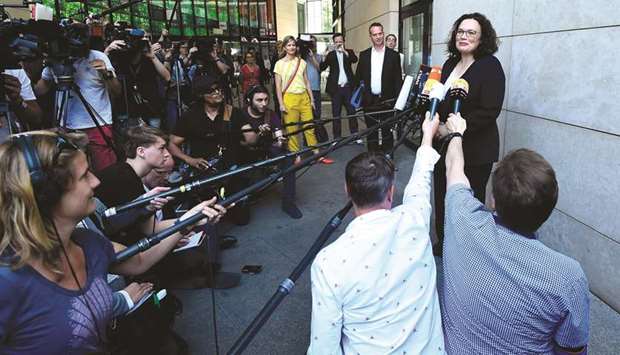Germany’s Social Democrats yesterday appointed three caretakers to run the party after leader Andrea Nahles resigned earlier in the day and SPD members, appalled by the party’s plunging popularity, called for ditching their loveless coalition with Chancellor Angela Merkel.
Nahles, the most vocal proponent of the SPD’s reluctant decision to form a third so-called “grand coalition” with Merkel’s conservatives, quit after a disastrous showing at European Parliament elections held on May 26.
One of Europe’s flagship centre-left parties, the SPD alternated power with the conservatives for generations but have been reduced to junior partners in coalition with Merkel since 2013.
Voters have punished the party for its decision to step in as a governing coalition partner of last resort.
In the European election the party was pushed into third place with just 15.8% of the vote, its worst showing nationwide since democracy returned after World War II.
To allow time to settle on a new permanent leader, the SPD selected three joint caretakers — Manuela Schwesig and Malu Dreyer, the premiers of the states of Mecklenburg-Vorpommern and Rhineland-Palatinate, and Thorsten Schaefer-Guembel, who heads the SPD in Hesse state.
Merkel, whose Christian Democrats also shed support in the European elections despite placing first, dismissed the notion that the three-way SPD leadership team was a sign of weakness in her coalition.
She said she wanted to get on with government business.
“I don’t have the impression that this is a sign of instability,” Merkel said. “At the moment, I see the SPD has made some decisions which I can’t say will hinder our work.”
The slump in support for the SPD is part of a broader decline of centre-left parties across Europe as they struggle to respond to the challenges of globalisation, digitalisation and immigration that have unnerved their working class base.
The ruling coalition is due to run until 2021 but a midterm review in the autumn could be an opportunity for the SPD to pull out of the alliance — a scenario that has growing appeal to party members fed up with sharing power with the conservatives.
“I believe a coalition walkout has to come,” said Simone Lange, SPD mayor of the northern city of Flensburg, who challenged Nahles for the party helm last year. “The question is when is the right time to do it.”
SPD leaders showed little appetite for pulling out just yet.
The three caretakers said the party leadership would discuss their approach to the coalition at a meeting on June 24.
Asked if he expected to still be vice chancellor in the coalition a year from now, Finance Minister Olaf Scholz replied: “If I was at the bookmaker’s, I would prefer this option.”
Scholz ruled himself out of running for the SPD leadership — as did the three caretakers.
The options facing the SPD are unappealing.
While staying in the coalition with Merkel alienates supporters, early elections would probably decimate a party now running third in the polls behind the surging Greens.
“In these straits, wild dreams have wings, and so the clamour for rebirth in opposition may end its unhappy marriage with Merkel,” said Josef Joffe, publisher-editor of the weekly Die Zeit.
If the SPD decides to pull out, options include new elections, an even more unwieldy coalition of three party groups, or a minority conservative government propped up on an ad hoc basis.
The price of any of these options would probably be an end to Merkel’s almost 14-year chancellorship.
The CDU is in no rush to hold new elections as Merkel’s heir apparent, Annegret Kramp-Karrenbauer, has made a poor fist of steering the party since taking its helm in December.
But the Greens, who soared past the SPD in the European elections and then came first in an opinion poll released on Saturday, said that if the grand coalition faltered there should be a new election.

Outgoing Social Democratic Party (SPD) leader Andrea Nahles addresses the media in front of the SPD party’s headquarters in Berlin yesterday.
